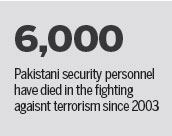Pakistan, US in spat over fight against terrorism
Islamabad to work with regional countries for peace in Afghanistan
ISLAMABAD, Pakistan - A vast majority of Pakistanis believe that the United States has failed in the war in Afghanistan and that US President Donald Trump is using Pakistan as a scapegoat.
In a major shift in his preelection approach to pull troops out of Afghanistan, where US forces have been involved in their longest war of 17 years, Trump last week decided to deploy more soldiers to the country.
Pakistanis also seemed upset at the US president's ignorance of Pakistan's anti-terrorism role, which has claimed about 73,000 lives, including over 6,000 security personnel, since 2003 when Pakistani troops were sent to tribal regions to fight against militants, many of whom had been forced to cross the border to Pakistan due to US military action in Afghanistan.

Trump had warned that his administration could no longer be silent about "Pakistan's safe havens for terrorist organizations, the Taliban, and other groups that pose a threat to the region and beyond. Pakistan has much to gain from partnering with our effort in Afghanistan. It has much to lose by continuing to harbor criminals and terrorists."
Experts in Pakistan are unanimous that Trump's new policy for South Asia is the continuation of the policies of his predecessors, Barack Obama and George W. Bush, to use the military option in Afghanistan instead of pressing for political negotiations.
Veteran Pakistani diplomat Ayaz Wazir argued that because the US is not winning the war in Afghanistan, it has started accusing and putting more pressure on Pakistan.
"This is a fact that Pakistan is very important and that is why Russia and China opposed pressure on Pakistan after President Trump unveiled his review for the region. Pakistan's role is more important even than the US in peace and stability in Afghanistan and the US should use this role," Wazir said.
Senior security expert Sayed Qaiser Hussain Shah said Trump has admitted that the US policy in Afghanistan has failed since the start of the war in 2001.
"As the US new policy is mainly shifted the blame to Pakistan, the government should increase its understanding and cooperation with Russia, China, Iran and other regional countries to jointly work for peace talks in Afghanistan," said Shah, who has served as Air Marshal in Pakistan Air Force.
He also pointed out that Kabul also lacks a clear policy to deal with the situation and efforts for political dialogue in Afghanistan could also reduce the influence of India.
Rahimullah Yousafzai, the resident editor of The News daily, said the US policy for South Asia is based on Trump's wishes, and that the US president did not recognize Pakistan's sacrifices against terrorism.
People in Pakistan backed the government's decision to postpone the visit to Washington by Foreign Minister Khwaja Mohammad Asif in the wake of Trump's serious accusations against Pakistan. The visit was reportedly scheduled last week.
US Acting Assistant Secretary of State for South and Central Asian Affairs Alice Wells also had to postpone her visit to Pakistan that was planned for this week at Islamabad's request amid tensions.
A senior Pakistani official who missed to remain anonymous said that the country had valid reasons to delay Asif's visit.
"It would show our weaknesses if the foreign minister visit the US despite wild accusation and to discredit Pakistan's unprecedented sacrifices against terrorism," said the official.
However, he added that Pakistan would engage with the US and there could be high-level contacts on the sidelines of the UN General Assembly next month.
The official said Pakistan is focusing on consultations with regional countries, including China, Russia, Iran and Turkey, to jointly work for peace in Afghanistan and the region.
Xinhua
(China Daily 08/31/2017 page11)








